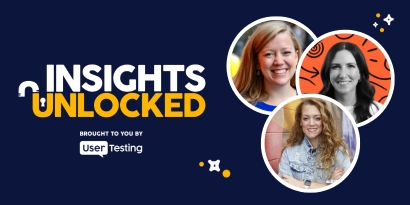
Episode 91 | September 11, 2023
Generative AI: hype or the future of customer experience?
In this week’s Insights Unlocked, UserTesting’s Michelle Huff talks with Liz Miller from Constellation Research about generative AI role in customer experience and how companies should start thinking about it within their go-to-market strategies.
Generative AI: hype or the future of customer experience?
Liz Miller believes generative AI can be a game-changing tool — the intern you never knew you needed — when crafting better customer experiences.
Miller, vice president and principal analyst at Constellation Research, shared her thoughts about generative AI in her Insights Unlocked podcast interview with UserTesting’s Michelle Huff at The Human Insight Summit (THiS).
“AI, right now, is like the greatest intern we never knew we needed,” Miller said. “It can save us all of that time. It can go and fetch all the things we need to go find. It bridges the gap between our human capacity and the Internet's expanse of data and creativity and all the things that we want to try to harness.
“But it's not going to come up with the most creative idea ever imagined in an ad or on a site or in an experience. Because for most of these models, what they do is predict the next thing, the next pixel, the next word, the next data set.”
In their conversation, they discuss:
- Misconceptions about generative AI
- Generative AI and storytelling
- Ethical considerations for brands when using generative AI
- Role of AI in design and content creation process
- How brands can ensure using AI fits with overall brand identity and values
Misconceptions about generative AI
Humorously, Miller said it is important to remind ourselves that generative AI is not a Ron Popeil chicken machine.
Legendary infomercial pitchman Ron Popeil could sell just about anything, including his ‘magical’ chicken machine that all you had to do was “set it, and forget it.” But there was no special magic to what was essentially just a rotisserie oven.
“We’re all thinking of AI like it’s this weird Ron Popeil chicken machine,” Miller said.

She said companies need to shift their perception away from viewing generative AI as a simple “set it and forget it” solution.
Instead, Miller said, “we have to really start to think how we want to put them into action, how to apply them. There needs to be a business use case, as with all technologies.”
Research from McKinsey and Company estimates that generative AI has the potential to unlock $4.4 trillion global productivity over the next decades and has the potential to drive a 5-15 percent increase in total marketing spending and a 3-5 percent surge in sales productivity.
“Something always has to come first. Something has to come first to unlock our imagination of what we could do with technology. And I think that is where we are right now with generative AI
Miller said generative AI has been the key that has “unlocked the door” for so many projects across large enterprises. But she urged companies to remember that the true value lies in how these models are applied rather than the models themselves.
“There has to be a strategy and there has to be a remembrance that what makes these models amazing is not the model itself.”
Generative AI and storytelling
Michelle and Liz explore how generative AI can enhance storytelling and co-create experiences with users.
Liz encourages businesses to engage with customers and gather feedback on AI applications.
“It comes back to this idea that everything is about storytelling these days, but everyone is part of the story. And everyone is part of the story creation. And that’s the difference,” Miller said. “The difference of what AI is doing, and what Web3 and all of these technologies are doing is they’re leveling the playing field so that our customers and all of our users, all of our employees, they’re literally co-creating stories with us in every moment. They’re giving us these little cues and signals that are saying, ‘This is what I want my story to be in your universe.’”
“And if you’re able to provide that to them, and if you’re able to pick up on that and enhance that and give them even more tools, that’s where the loyalty and that’s where the advocacy is going to come, even when AI is what’s driving it.”
Ethical concerns of AI and data ownership
The conversation turned to ethical considerations surrounding AI and the importance of transparency in data usage.
AI, similar to all technology, can have great applications and horrible applications, Liz said. “Don’t ask it to do nasty things,” Liz said.
Liz shared an example of data misuse in AI models, highlighting the need for user understanding. She said as organizations integrate more and more AI into their products and services, they really need to ask themselves the question, “Do my users understand my terms and conditions?”
Role of AI in design and content creation process
"AI is not going to steal your job, it's going to make your job a heck of a lot easier because it's going to be like, ‘Here, I took your great idea and made 15 iterations of it in 90 different color palettes,’" Liz said.
She and Michelle talked about the importance of designers and other creators to embrace and play around with generative AI tools rather than being afraid of them. And, Liz said, layering generative AI on those other AI tools will help you narrow those 15 iterations and 90 color palettes down to three.
How brands can ensure using AI fits with overall brand identity and values
Machine learning tools and technology will dramatically improve a wide range of activities within a company — and do so successfully. But brands should be transparent with their customers and employees about when and how they are using that technology. That’s because people still don’t quite understand or trust the technology.
Liz brought up examples such as people preferring to seek human doctor diagnosis rather than machines, despite the AI diagnosis being more accurate; or trusting generative AI to write your history paper but not trusting it to write your dating profile.
So, her advice is to be upfront with customers rather than have them discover later on that the customer service agent they’ve been chatting with is actually a bot named Bob.
Episode links:
- Liz Miller on LinkedIn
- Constellation Research
- Liz Miller on X (formerly Twitter)
- CBS Sunday Morning news profile on Ron Popeil










